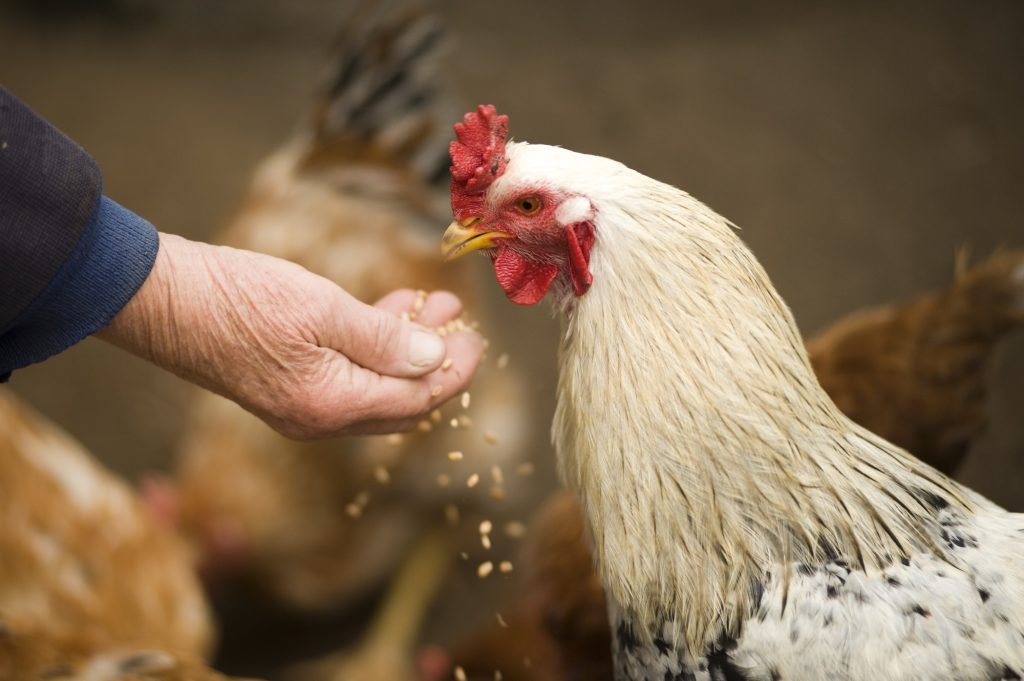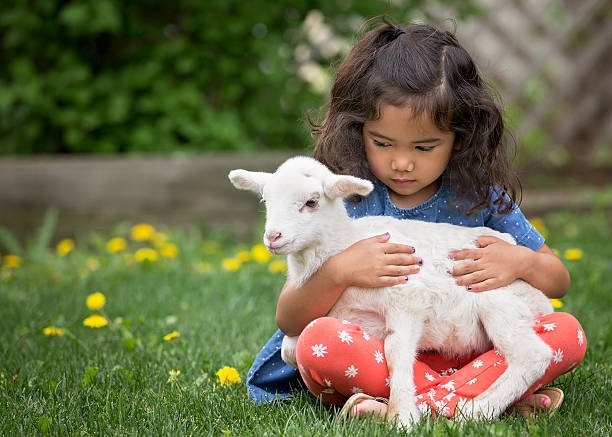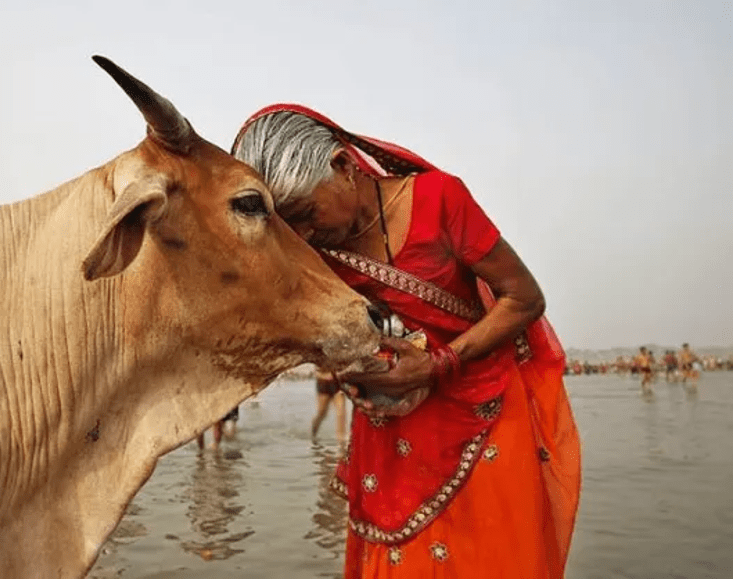



Communitarians live by the principle and practice of maintaining their health at the maximum level in order to participate and contribute to the preservation and elevation of local, regional and global; human, ecological and animal kingdoms. In this regard, eating and drinking is considered an act of demonstrative alignment with and reverence for all three kingdoms.
By keeping humankind’s symbiotic relationship with the animals, forefront of their minds, communitarians partake not of the dead bodies of their warm-blooded friends. For both health and morality’s sake, communitarian’s regard their own lives and the lives of all living creatures, as sacred, and thereby worthy of honour and preservation.


The sheep who clothe us, and the cows who supply manure to fertilise the orchards, along with the hens, roosters and the chickens who guard the groves of fruiting trees from destructive pests – all have a place in communal union. As such, communitarians are charged to love, honour and protect their health and wellbeing by ensuring all creatures great and small, have access to food, water, shelter, comfort and suitable habitat to enable them to live their lives in freedom, association and enjoyment of all the earth has to offer.


Across the earth, men and women, young and old, of many and varying cultures and language groups, continue to advance the legacy of the many historical individuals and communities who have contributed much to dietary reform and animal liberation. By thoroughly studying this critical knowledge and example, communitarians advance their competency to abide by the principle and practice of daily building up and renewing their bodies.
Communitarians understand that the quality of their thoughts and even the capacity to think rationally and creatively, as well as, feel, perceive and productively process all incoming and outgoing vibrational stimuli, very much depends upon the proper nourishment and exercise of the body. The intricate and largely unfathomed apparatus of the brain and nervous system, require the purest and finest elements to function at the highest level. Scientific proof abounds that pure food produces pure blood – pure blood underpins the proper functioning of all organs, including the central regulator of all organs – the Brain.


Eating the flesh of living breathing conscious sentiment beings is certainly a threat to our planet, if for no other reason than it is a threat to human consciousness. While the slaughter of ‘Living Sentiment, Beings’ remains an acceptable dietary norm, the human race will be held back from solving the perpetuated problems that are rooted in disrespect for life itself. The day is dawning where the ‘disrespect’ for the life of animals will be seen and challenged as transference to disrespect of each other that results in inequitable distribution of resources and opportunities which are essential to sustain and evolve life.
The lifestyle and moral change required to live by the first principle and practice of communitarian union, calls the communitarian to radically reconfigure their relationship to animals from one of exploitation and supremacy, to one of love and solidarity. By adopting the principles and practice of ‘Eating from the Living Trees’ communitarians unleash the creativity and innovation needed to overcome acceptance and dependency on the exploitation of animals to satisfy previously corrupted appetites for flesh foods that disregard the sanctity of their ‘right to life and liberty’.
Communitarians are fully aware that their dietary reforms are idealistic. Nonetheless as an ethical community, the unions strive for systemic and utopian change due to the understanding that it is the search for perfection that propels both personal and societal progression.
While exposing and reforming our dietary choices to divorce the hypocrisy of speciesism, communitarians disrupt the normalisation of violence against animals. Through learning to ‘eat from the living trees and researching methods as well as creating and presenting narratives that do not rest on a paradigm that subverts the right to life and liberty of our fellow beings, communitarians contribute to building alternative communities and institutions that model how society can function and even flourish without resorting to the exploitation of animals.

In all ages, diets of animal flesh and their bodily excretions has never promoted cultures of peace or higher morality. In contrast, the Brahmin, Buddhist, Hindu and early Christian doctrines were all founded on the principles and practice of reverence for the life of all living things. As a demonstration of the principle of ‘reverence for life’, many cultures and religions abstained from eating the flesh of murdered animals.
All who have aspired to purity of thought and harmony with nature, animals and their fellowman, have by conscience and reason evolved their diets to eat from the living trees, thus adhering to a bloodless compassionate way of nourishing their bodies.
Gautama Buddha and Pythagoras, Plato, Aristotle, and Epikurus, Seneca and Ovid, Plutarch and Clement (of Alexandria), Porphyry and Chrysostom, Gassendi and Mandeville, Milton and Evelyn, Newton and Pope, Ray and Linné, Tryon and Hecquet, Cocchi and Cheyne, Thomson and Hartley, Chesterfield and Ritson, Voltaire and Swedenborg, Wesley and Rousseau, Franklin and Howard, Lambe and Pressavin, Shelley and Byron, Hufeland and Graham, Gleïzès and Phillips, Lamartine and Michelet, Georg Friedrich Daumer and Struve – are some of the more or less famous, or meritorious, names in the past to be found among the prophets of reformed dietetics, who, in various degrees of abhorrence, have shrunk from the regime of blood.
Aristotle, Pythagoras, Leonardo Da Vinci, Anna Kingsford thought to be the ‘mother of Theosophy’, Henry David Thoreau, Mahatma Gandhi and Leo Tolstoy, along with many famous philosophers, doctors and peacemakers adopted pure eating and drinking in order to develop pure feeling and thinking.

Throughout the ages across the globe, communities have formed around the principle and practice of bloodless diets underpinned by the belief that all living creatures have the right to life and liberty. Legends preserved in the poet Ferdowsi’s epic, ‘the Shahnameh’ thought to be created between 977 and 1010 CE, point to the probability that prior to the advent of Zoroastrianism, ancient Aryans followed vegetarian diets. The Shahnameh informs us that during the Aryan Stone Age – the Age of Gaya Maretan (Gayomard, Kaiumars) – people sustained themselves by gathering fruits and other plant foods.
According to 3rd century CE Phoenician-Tyrian philosopher & vegetarian advocate Porphyry in his work De Abstinentia, “The first and most learned order of the Magi neither eat nor slay anything animated, adhering instead to the ancient moral practice of abstinence from defiling their bodies by consuming the flesh of slain innocent animals.”
There are numerous verses within an array of surviving Zoroastrian texts that show that those who followed the teaching of Zarathustra, revered the souls of animals in the same manner as they revered the souls of humans. Perhaps the most explicit call for Zoroastrians to be vegetarian is found in the Sayings of Adarbad Mahraspandan, which states: “Abstain rigorously from eating the flesh of kine and all beneficent animals (gospandan) least you be made to face a strict reckoning in this world and the next; for by eating the flesh of the kine and other domestic animals, you involve your hand in sin, and (thereby) think, speak, and do what is sinful; for though you may eat but a mouthful, you involve your hand in sin, and though a camel be slain by (another) person in another place, it is as if you (who eat its flesh) had slain it with your own hand.
The Cathars, also known as Perfecti were expected to live on vegan fare that excluded the eating of eggs, cheese, and even the animal fat so often used in medieval cooking from their diets. At that time, Catholic monastic orders tended to limit or exclude meat, however the Catholic rules of diet were not as strict regarding the consumption of other animal products, as the Cathars.
Contemporary ethical rationale regarding the relationship between humans and other animals has markedly departed from the traditional Western and Christian view that nature and animals can legitimately be exploited for human purposes.
However several Christian denominations have risen to return to the original Christian ‘non-violent’ creed. Amongst these are The Society of Friends that were the first Christian denomination to form a faith-based vegetarian association, establishing the Friends Vegetarian Society in 1902. Otherwise known as the Quakers this Christian group previously also played a major role in the formation of the Vegetarian Society of England in 1847.
Following the foundation of these many historical examples of evolved ethics and subsequent dietary reform, contemporary environmentalism and ethical philosophies maintain the stance that nature and animals have rights, and thus should not be exploited in an unrestrained and unlimited manner.
In the current age, Animal Rights Activism is the fastest growing activist platform across the globe.